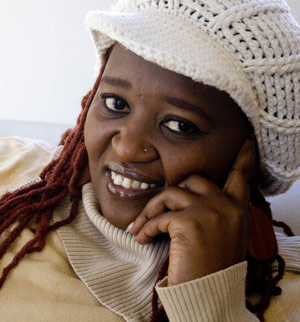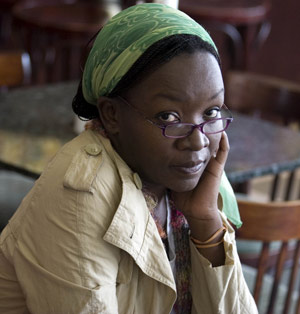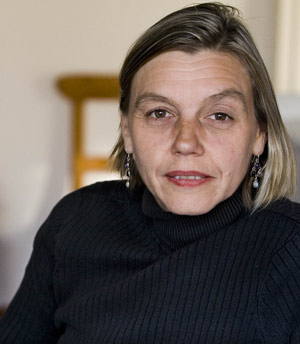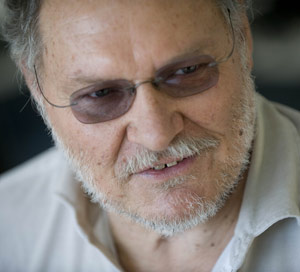Let’s quickly get the figures out of the way: the SABC is about R800-million in the red.
Production companies are owed R10-million and 25 shows, including Isidingo, Zola 7, Generations and Home Affairs, have been affected.
One assumes that Jacob Zuma’s promise as he took office of ‘a new era in the history of our nation” was well received by people who make local television possible. It’s not unreasonable to assume that they too would like to be included in Zuma’s ‘new era”, given that the old one didn’t serve them too well.
It’s in this context that the Mail & Guardian went out to talk to five of the country’s scriptwriters.
They all agree that the SABC needs to do things differently. More of the usual behaviour by the sector’s most important client could result in the sinking of some production companies and, with them, some of the country’s most followed plots.
Because of the woes of the industry, scriptwriting is an occupation that practitioners may love but find difficult to commit to. But one gets the feeling that scriptwriting, as with broadcasting, is in throes of change. One wonders whether the impending transformation will serve the needs of scriptwriters, an often marginalised sector in the industry.

John Trengove
The Lab, season 1 (writer/director), Hopeville (head writer/director), Bay of Plenty (director), Hard Copy (director) (Photo: Delwyn Verasamy)
John Trengove’s unhurried look and soft voice belie his intense personality. When I met the New York University-educated scriptwriter and director at a coffee shop in Rosebank Mall, Johannesburg, he was dressed in a brown vest, black jacket and jeans.
Trengove is an interactive interviewee and talks with little prompting. ‘SABC as the national broadcaster is responsible for the entire industry — that includes actors, directors, producers and scriptwriters.”
It should be responsible for growing and nurturing talent, he says, adding that it’s not a responsibility it carries out well. In the past, Trengove says, he turned down certain jobs because he expected to do SABC-commissioned work. ‘Some of this work got cancelled — there is no guarantee,” he says.
Trengove, who was the head writer and director for The Lab, views the SABC as a ‘dense, impenetrable bureaucracy” and an organisation in which ‘no accounting is done in the way work is commissioned”.
He says production budgets ‘have stayed the same for years”. And, unlike the BBC, its counterpart in Britain, Trengove believes the SABC hasn’t done much to ‘raise the bar, cultivate and nurture new talent”.
He hopes Jacob Zuma’s incoming administration will result in a new management set-up at the broadcaster, one that will ‘create more efficient processes” and ‘simplify the commissioning process”.
For a person who makes his living from TV, Trengove doesn’t watch a lot of it. ‘I spend so much time making it that I don’t have much inclination to watch it.” The reason may lie in the fact that he’s a director, not a scriptwriter.
Later this year he will shoot a gay film about rent boys in Beaufort West, Cape Town. He is fascinated by this ‘voiceless community” that lives ‘in the cracks of our society”.
Trengove says South Africa should ‘harness what makes us unique and exploit this and export it to the world”. The reasoning is simple: we can’t out-Hollywood Hollywood.

Bongi Ndaba
Generations, Jozi-H, Gaz’lam, Hillside (Photo: Delwyn Verasamy)
I was scheduled to meet Ndaba, playwright, actress and senior scriptwriter, on a Saturday at Killarney Mall. Yet on my way she calls to say we should instead meet in Melville, where her niece has to be dropped off for tennis classes.
She arrives at the interview accompanied by her mother, just arrived that morning from Durban.
Ndaba acted in last year’s television miniseries, Izingane zoBaba, an adaptation of Shakespeare’s King Lear, directed by Tim Green. Early in the discussion she is quick to declare, ‘we don’t have many black writers in South Africa”.
She explains that ‘it’s not a well-paying job and some people give up”, adding, ‘young people expect to come in and earn plenty. When I started I wasn’t earning — there were times when I had to ask my mother to help out with rent money.” She casts an approving glance at her mum.
Not so these days when she ‘sometimes turns down jobs. I now have the freedom to choose. I can choose whom I want to work with.”
She went into scriptwriting in 2003 when the soap opera Generations was recruiting black writers. ‘It was difficult at the start. But Generations gave me the chance.”
She says that on Generations ‘scripts are written in English and then translated into isiZulu and seSotho”. But this is often a challenge for second-language English speakers, a scenario complicated by the fact that ‘not much money is put into training those who are coming in”. Ndaba says that ‘Generations doesn’t have a training budget”.
She says that not many black people are coming into her profession. I ask why this is so. ‘Black kids should move away from saying I want to be an actor,” she says. ‘The TV actor is the first person they see. It’s time for young people to ask themselves: do I have the talent for this?”
Ndaba criticises the celebrity culture that values spectacle. My thoughts turn to 19th-century German philosopher Ludwig Andreas Feuerbach, who noted that too many favour ‘appearance to the essence, representation to reality”.
She says: ‘We see people who are on TV for two minutes and the next moment they are on the cover of a magazine. Is this sustainable? We’ve got to look deeper than the hype.”
She bemoans the woes at the public broadcaster, a state of affairs that has made life difficult for writers. ‘We depend on writing. Certain projects have been postponed.” This is not hypothetical. A TV drama, Shreds and Dreams, based on a play she originally wrote for a Market Theatre production, is complete and awaits the nod from the decision-makers at the corporation.
She watches a lot of local TV and believes the quality has improved. ‘We don’t have the kind of money that international productions have. If you consider the money we have we are producing really good stuff.”

Chisanga Kabinga
Generations, Muvhango, Tsha Tsha, Place Called Home, Soul City, Soul Buddies, Ubizo, Hillside, Khululeka, Hard Copy (Photo: Oupa Nkosi)
One of the first things Kabinga tells me is that in her industry there are ‘ridiculous deadlines”. The situation in television production is not made easier by the fact that scriptwriters are ‘treated like a cog in a wheel, in a highly pressured industry”.
Kabinga observes that although ‘you can’t do without scriptwriters, they are often not the best paid people in the industry”.
Her profession doesn’t seem to make space for newcomers. ‘When I am asked for new names, I give the names of people that I gave three or four years ago,” she says.
The Zambian-born writer studied sociology and marketing at the University of Cape Town and, finding the world of retail stifling, made a mid-career shift and went to work as an intern at Generations in 2003 — the same year as Ndaba.
After working on the popular soapie she ‘had a bit of TV experience and some credibility. I could walk into any production and have a fighting chance. But every time you sign on to a project, you still have to prove that you are good — and if you are new it’s harder to even get a foot in the door.”
She is curious about what the restructuring of the SABC will bring under the newly appointed Cabinet: ‘We have seen political satires pulled. You ask yourself: ‘Should I hold back from the kind of work that I want to do? Or should I play safe and respond only to briefs that are apolitical?’” As a free spirit she finds it difficult to work on projects that ‘compromise” her creativity, but has learned to stick it out and, as much as possible, to pursue fulfilling work that has minimal editorial constraints.
Kabinga wishes there were more television stations. ‘It would make a huge difference to the industry. It would avail more work for independent producers and, by extension, writers. It would become more competitive.”

Lesley Cowling
Isidingo, Shado’s, Rhythm City (Photo: Delwyn Verasamy)
It’s just as well that Cowling has a full-time job at Wits University, where she teaches in the journalism and media studies department.
She finds scriptwriting ‘underpaid and undervalued”, partly because budgets for drama are not high in South Africa. She says there is a perception that the standard of writing in South Africa is lower than in other countries. ‘I don’t think this is the case — writers here just get paid much less than their American counterparts, for example, and work under very pressured conditions.” This means they have to churn out scripts in short time frames to make ends meet and quality suffers.
‘Despite this, I think we have some brilliant writers. When I was script editing for Isidingo, I was sometimes amazed at the scripts writers produced in the space of a few days.”
Cowling, who also teaches a creative writing course for journalists, said some producers can be ‘exploitative”, adding that ‘writers often don’t get a lot of respect from producers. There is this idea that anyone can write. I remember one executive producer who was quoted in a Sunday newsaper saying there are no good scriptwriters in South Africa.”
She says there are ‘comparatively few black people in the industry”, an industry that’s generally difficult to break into. She says that many of the country’s tertiary education curricula focus on film rather than television, especially sitcoms and soaps.
Cowling got into the industry by sitting in on Isidingo’s writers’ meetings and by writing a test script. Other ways of getting in are through internships or networking.

Richard Beynon
Isidingo, Rhythm City (Photo: Paul Botes)
Talking to Beynon gives you perspective on the scriptwriting profession in South Africa. He started as a reporter at the now-defunct Rand Daily Mail in the 1970s. He left journalism in 1978 for the more imaginative occupation and started writing scripts for industrial documentaries and training videos.
After a while he ventured into writing drama, starting with a script for an adaptation of a Pauline Smith short story called The Pain, which won an award for best one-off drama of the year. When he went into scriptwriting ‘there were only two or three writers; now there must be 50 people at least”, he says at his home in Parkview.
The scriptwriters to whom I have spoken have complained about the meagre amount of money trickling their way. And it’s not so different for the veteran writer, once a head writer on Isidingo and now a freelancer on e.tv’s Rhythm City. Although ‘you can make a reasonable living, we are routinely treated with disrespect”, he says.
He finds that budgets for productions are quite tight. ‘We’d get more things right if we had more money.” If the industry is reluctant to reward them, recompense is in the writing itself. ‘It’s great work, a constant exercise of the imagination,” Beynon says.
The other reward comes in being given freedom to work from home without the strictures that come with the nine-to-five office routine. ‘I don’t work well in a corporate environment,” he says.
He’s aware that there’s a small pool of black writers. ‘It’s ludicrous that a show such as Rhythm City is mostly written by white writers,” he says, but it’s an improvement from ‘five years ago when one could barely find black writers”.
Beynon doesn’t find writing for a different culture and race intimidating. He bridges the differences by doing a lot of research. ‘As a writer you have to get under the skins of people,” and more importantly, gesturing at our common humanity, ‘we laugh at the same things.”
Before we wind up our interview, Beynon, who also holds writing workshops, dispenses advice for would-be television dramatists: ‘Download scripts from the internet, read a lot and practise writing — it doesn’t matter if you get it wrong.”
Finally, he alludes to the drudgery of getting noticed by the big, wide world: ‘Then take your script to every production house in town.”